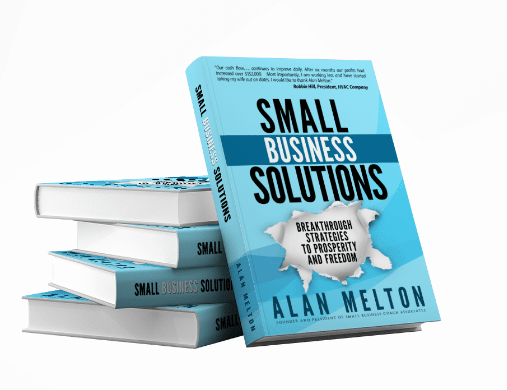VIEW BY TOPIC
- Finding Customers
- Business Systems
- Managing Employees
- Leadership
- Managing Money
Related Posts

Ready to Grow Your Business Fast?
Here’s How I Grew Five Businesses, and Eventually Sold One to a Fortune 500 Company.

Why Every Small Business Should Have a Business Account
Your business plan is in place and you’re getting ready to thrive, the next step you should consider is to get a business account.
At the outset, many business owners may rely on their personal bank accounts for business transactions, sometimes assuming it to be the most convenient option or that their operation is informal or does not make enough profit to justify a separate account with additional fees.
However, having an account offers more benefits than not, no matter how small your business is.
This article will break down the reasons every small business should have an account and walk you through how to open one.
What is a business account?
A business account is a financial account designed and used exclusively for business purposes, often registered under a company’s name. It offers specific features that are customized to meet the needs of businesses, such as merchant service, card security features and check insurance.
This account is used to keep track of cash balance, business debts, creditor payments, and employee payroll if any.
Why should small businesses have a business account?
At its core, having an account can prevent conflict of interest between personal and business transactions, as well as minimize tax complications.
But the full benefits extend beyond a separate wallet, the following are the main advantages:
For legal compliance

One important reason for a small business to open an account is legal requirements. Businesses operated as separate entities, whether it be a limited liability company or partnership, are mandated by law to have a separate business account.
Sole proprietorships, on the other hand, do not necessarily require one, but opting to have a business account will allow you to take advantage of other perks detailed ahead.
For better bookkeeping & easier taxation
You cannot escape taxes, and not separating your business and personal finances from day one will make bookkeeping messy and tax season painful.
Plus, having a clean record is beneficial for long-term business and financial analysis. It enhances the accuracy and reliability of the data used for decision-making, marketing, sales, operational performance, and cost reduction.
For better cash flow management
Insufficient cash flow is the leading cause of small business failure. Statistically, 82% of small business fail because of cash flow problems.
Having a business account does help, starting with improved bookkeeping, and followed by effective cash flow management.
By tracking income and expenses easily and accurately, you get a clear picture of your business cash flow status and financing options for improving it. For example, you can identify when to reduce spending or speed up account receivables.
For a credit card payment option
In business, a smoother experience is key, and having more payment options, like a credit card, contributes to a positive checkout experience.
Using a personal account for credit card transactions may come with limitations on personal use, issues with third-party providers, and bank incompatibility.
On the other hand, an account is designed to accept card payments, allowing for higher transaction volumes, lower processing fees, and potential access to more loyalty programs. Plus, the money goes directly to your business account.
This means you can offer customers more payment methods and ultimately boost your sales.
For professionalism
Building trust with customers, business partners and employees is as important as anything else. Long story short, mismatched business names and payment system names can raise suspicions among customers and may hinder your potential business partnerships.
For business tax deduction
You do a business, you’d want a business tax deduction if you’re subjected to one. It’s your right.
To claim a small business tax deduction, you want an authority to recognize your business as legitimate, rather than a hobby. While having a business account is not the sole criterion, it will play a role in maintaining a neat accounting and helps convince the authority when combined with other criteria.
For a better business credit
20% of small business loan applications are denied due to company credit. So, if you’re looking to gain, you’d want to build a good company’s credit history as groundwork for growth.
Whether you’re applying for a small business loan or pitching to investors, a proper business account and an organized record will increase your trustworthiness and chances of getting that fund.
For protection
If you registered your business under the limited liability type, you have already acquired a type of protection where your personal assets won’t be at risk if your business were to encounter legal problems.
However, this protection isn’t foolproof. If you’re mixing personal and business finances in the same account, you could have a difficult time proving what belongs to you and what belongs to the business. This means your personal assets are exposed to risk regardless.
Furthermore, having a separate account helps protect your personal identity.
When to open an account?

As soon as possible.
If you have not started your business yet, do it before you start receiving or spending money for your business.
If you have been using personal accounts for business, switch as soon as you can.
And rest assured, the trouble of visiting a physical bank in person during busy hours can be avoided with online banking. Simply gather all the right documents and apply online.
What to consider for a small business account
When you choose an account for your small business, consider the followings:
- Fees
A business bank account typically charges fees, such as monthly maintenance fees, monthly service fees, transaction fees, merchant services fees, credit card fees, overdraft fees, etc.
Look for one that fits your budget.
- Minimum requirement
Some business accounts require a minimum opening deposit, minimum balance requirements or minimum required transactions. This means they will charge a fee if you fall below that amount.
Look for a business account with low or no minimum requirements, or that offers a grace period before charging fees.
- Payment capabilities
To offer the best service to your customers, you should choose payment providers that support a wide range of payment methods, such as debit cards, checks, online bill pay, mobile wallet, and peer-to-peer payment.
- Integration
Choose an account that can integrate with accounting software, invoicing platforms, and payroll services to streamline your work process.
How to open a small business bank account?
Now that we have discussed the advantages and what to look for in a small business bank account, we assume you finally want one. So let’s quickly go over the steps to have one in this section.
1. Research
Not all banks offer small business bank accounts, so the first step is to research the banks or financial institutions that do. A good way to start is to look for the banks or financial institutions near you and compare what they offer.
Some factors to consider are their fees, features, banking services, local branch and ATM locations, online banking options, a business credit card, a business debit card, currencies they accept and their reputation.
However, keep in mind that there is a possibility of a bank discontinuing their account services, which means you need to transfer to another bank, potentially causing disruptions in your business operations. Therefore choosing a reliable bank is your safest choice. You can check the bank’s reviews and history to get an idea of its stability.
2. Choose the account type
There are three primary types of business accounts, each offering distinct benefits and suitability.
- Business checking account – A business checking account is the most common type of business account and is arguably perfect as a small business account due to its versatility and fewer restrictions.
You can use a small business checking account to deposit funds through checks or ATMs, do a wire transfer, withdraw cash, and receive and transfer money electronically. Many checking accounts can also be integrated with business tools to keep track of transaction reports or manage cash flow.
- Business saving account – A business saving account is a specific type of business bank account that lets you securely store funds, setting aside cash reserves for emergencies, tax payments, and overdrafts. It also offers a higher interest rate than a checking account, which let you earn while saving. However, it often comes with a withdrawal limit.
- Merchant account – A merchant account is a specialized business bank account designed specifically for processing electronic payment card transactions such as debit and credit cards.
This type of account has its own fee structure.
For small business owners, a flexible checking account is usually beneficial. However, if you handle a lot of cash, consider a small business savings account for higher interest.
Plus, you can have multiple business accounts so long as they are beneficial for your business.
3. Gather information about your business
Next, gather the necessary information and documents to open an account. Requirements may vary based on the bank and account type, but generally, you will need the following:
- Your tax identification number (EIN) or social security number (SSN)
- Your personal identification
- Your business name and address
- Information about your industry and the nature of business
- Your business license or registration certificate
- Your articles of organization or incorporation
- Your estimated annual revenue and number of employees (if any)
- Your partnership agreement or operating agreement (if applicable)
For sole proprietorship, you can use SSN as a tax identification number in place of EIN and you may need to prepare a DBA (doing business as) certificate if your business name is not the same as your personal name.
4. Apply for an account

Once you have sorted out the eligibility and required documents, the final step is to apply for the chosen account. You can do this online, by phone, or in person at the bank branch.
If your application is approved, you should receive account materials such as an account number, routing number, and debit card, either by mail or email. You should also be able to set up your online banking and mobile banking access.
Tips to manage a small business account
- Understand your service provider’s terms and conditions – This can help you avoid any hidden fees, penalties, or limitations that could affect your business operations.
- Keep track of your documentation – Maintain records of your invoices, receipts, contracts, and any other business-related documents. This will help you verify your income and expenses, prepare your taxes, and resolve any disputes or audits.
- Classify the transactions – Categorize your transactions into different types, like income, expenses, assets, liabilities, and equity. This keeps your accounting organized, allowing you to track performance and analyze profitability effectively.
Final thought
It can be challenging to open a business bank account with traditional banks due to a lot of their requirements or restriction. However, your business account doesn’t need to be with a traditional bank if it does not suit your need, you can consider an online account from neobanks or alternative financial institutions where they offer more flexibility, cater to international business and may have an easier application process.
As long as it has all the features you need to streamline your business process, maintain neat accounting, and satisfy your customers, you’re good to go.














